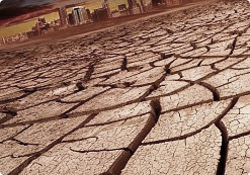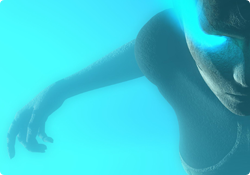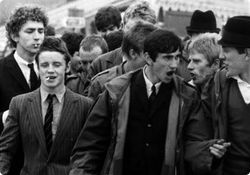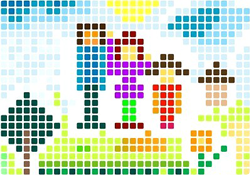UNDERGRADUATE SEMINAR
Biodiversity and Culture
Wednesdays 9:00am-Noon
Quarter: Spring 2013
GRADUATE SEMINAR
Posthumanisms
Mondays 9:00am-Noon
Quarter: Spring 2013
ENGLISH 115E
Science Fiction: Technology, Ecology, and the Reinvention of the Body
Quarter: Fall 2012
 ENGLISH 100C ENGLISH 100CLiterary History III (Lecture) Quarter: Spring 2010-2011 Taught by: Ursula K. Heise, Nicholas Jenkins and Franco MorettiLiterary History III traces the evolution of literature from the early nineteenth to the early twenty-first century. The course focuses on how literary texts engage with forces of modernization, industrialization, and colonialism in the nineteenth, and with urbanization, world wars, the resistance to Western political domination and the emergence of global networks in the twentieth and twenty-first centuries. Human identities, minds, bodies and communities are shaped and reshaped in literary texts that seek constantly to find new ways to intervene in the rapidly changing landscapes of modernization and postmodernization. As they reshape themselves in different media from the nineteenth-century serial novel to the contemporary hypertext poem, narrative and poetry creatively encounter other expressive media such as film, television, pop music, and digital culture. In the process, they redefine the roles of authors, narrators, lyrical voices, characters, and ultimately readers themselves. |
Download the course syllabus. |
 IHUM 71 IHUM 71Sustainability and Collapse Quarter: Fall 2010 Co-taught with Prof. Mark Zoback, Dept. of GeosciencesContemporary environmental crises such as climate change, species extinction, pollution, deforestation and soil erosion highlight that all human societies depend in intricate ways on their interactions with natural resources, ecosystems and other species. Some human societies survive for thousands of years, whereas others collapse after a few decades or centuries. Exploring such cases of survival and collapse requires drawing on the resources of the sciences as well as the humanities, since they usually involve complex interactions of natural resources and limits with social organization and cultural ideas and values. “Sustainability and Collapse” will explore these interactions and the complex societal issues to be faced in the 21st century. We will ask where our current concepts of environmental sustainability, crisis and disaster come from, how they are used, and how effective they are for addressing the problems that surround us.”Sustainability and Collapse” will explore what people in different historical, geographical and cultural settings envision as successful ways of living with nature, how such ways of life come under pressure, how they deal with crisis, and how cultural ideas and practices shape these processes. The class will focus particularly on the interface between scientific information and concepts with the stories and images that literary texts, films and popular culture use in addressing questions of environmental crisis and survival. What do we mean by “nature,” and how do we envision its functioning? What stories do we tell about how societies have either ignored or attempted to “improve” the workings of nature? What textual and visual images inform our ideas about what it means to live sustainably? Do they accord or conflict with scientific insights into human uses of nature? In what ways have such stories and images informed the way in which we, individually and collectively, have thought about and interacted with landscapes and other species? Do different cultures mean different things when they refer to nature, survival and crisis? |
Download the course syllabus. |
 ENGL 176 ENGL 176Science Fiction: Techno Dreams and Nightmares Quarter: Spring 2010Science Fiction is the cultural genre through which modern societies think about their relation science and technology – sometimes with enthusiasm and sometimes with fear. “Techno Dreams and Nightmares” will trace our real and imagined relation to science and tech from the origins of the science fiction in nineteenth-century European literature to current North American and Japanese developments through the theme of technologically created humans and animals. Mary Shelley’s Frankenstein (1818/1831) sets off two different ways of thinking about human minds and bodies shaped by science and technology: one which focuses on mechanically produced minds and bodies such as robots, computers, cyborgs and AIs, and one which foregrounds biologically engineered beings such as evolved animals, androids, clones and, sometimes, aliens. The course will examine both of these traditions comparatively. How do we draw the boundaries between humans and machines, and between humans and animals? What should we think of as parts of a human body, and what is “alien” to it? How do science and technology alter the way we think about the relationship between mind, body and environment? How do new technologies affect perception, emotion and memory? Do male and female bodies have different relationships to technological artifacts? Does “being human” mean something different now than in the nineteenth century? These are some of the questions we will pursue through the study of SF novels, films and comic books (graphic novels), including Wells’ Island of Dr. Moreau, Bioy Casares’ The Invention of Morel, Dick’s Do Androids Dream of Electric Sheep?, Scott’s Blade Runner, Gibson’s Neuromancer, Sterling’s Schismatrix, Atwood’s Oryx and Crake, Oshii’s Ghost in the Shell 2: Innocence, and Morrison and Quitely’s We3. We will also consider contemporary gaming environments such as Second Life as one of the newest fields in which science fiction can evolve. |
Download the course syllabus. |
 MTL 334B / ENGL 334B MTL 334B / ENGL 334BThe Modern Tradition 2: The Study of Culture in the Age of Globalization Quarter: Spring 2009This seminar will offer a survey of 20th-century theory with focus on the concept of culture and methods of studying it from diverse disciplines including sociology, anthrolopogy, history, literary and cultural studies. Discussions will emphasize modernization, postmodernization and globalization processesin their relations to culture broadly understood, cultures in their regional, national and diasporic manifestations, and cultures as internally differentiated (high and low culture, subcultures, media cultures). Theoretically, the class will introduce students to Marxist conceptions of culture; the Cultural Studies paradigm as it evolved in Britain in the 1960s with its emphasis on working-class and youth subcultures, and changed when it was adopted in the United States in the 1980s; Bourdieu’s sociological concept of the “habitus”; approaches to the connection between concepts of culture, colonialism, and postcolonialism; postmodernism and culture; debates about travel, nomadism, diaspora, cosmopolitanism and the emergence of a global culture; and new theories of the relation between science, technology, culture and the natural environment. |
Download the course syllabus. |
 ENGL 153G / STS 114 ENGL 153G / STS 114Technology, Ecology, & the Imagination of the Future Quarter: Summer 2007This seminar is especially oriented toward the interests of majors in English, STS, and Earth Systems. It explores scientific and literary visions of the future between the 1960s and the present, with special emphasis on how natural scientists, social scientists, writers and film makers imagine the relation between technologies and natural organisms or ecosystems. We will explore how the dividing line between nature and culture/technology is drawn, in what areas and by what means the connection between present and future is established, how visions of the future shape present-day attitudes and policies, and where scientific extrapolations and literary storylines converge or collide. Students will be trained to use concepts and methods from literary and cultural analysis in the study of stories and images about technology and the environment, with particular emphasis on narrative theory, theories of metaphor, and risk theory. How do particular story patterns and images shape the way we think about our relationship to the natural environment in the present and the future, and how do such stories and images shape policies? Are environmental stories about the future mostly pessimistic, or is it possible to device ecological utopias, and in what ways would they be useful?Readings for the class will include a variety of media. We will discuss classics of environmental projections of the future from Rachel Carson’s book Silent Spring all the way to Al Gore’s film An Inconvenient Truth, along with more speculative visions of the present and future in novels, short stories and films (such as Hayao Miyazaki’s animated film Nausicäa of the Valley of the Wind) as well as computer games (SimCity). More theoretical and generally shorter readings in sociology, philosophy, linguistics and literary criticism will provide the conceptual vocabulary which we’ll use to think about these creative works. |
Download the course syllabus. |
 ENGL 366F ENGL 366FMedia Theory Quarter: Summer 2007One of the most fundamental changes that has affected writing and reading over the course of the twentieth century is that both activities have had to resituate themselves in a systemically altered landscape of media technologies. This seminar will explore theoretical debates about issues of media technologies, aesthetics and literature in the 20th and 21st centuries. Crucial theoretical readings will alternate with creative texts that operate in a variety of media from the conventional novel and short story to the graphic novel (comics), film animation, and digital narrative and poetry. Since this seminar is anchored in the Department of English, it will keep some focus on the verbal, textual or “literary” dimensions of these different media. Graduate students from other fields are welcome to put the emphasis on other dimensions and issues in their own work (e.g. sound art, film theory, painting, new media art), according to their interests, and to feed their work back into the seminar.Readings and discussions will focus on the following issues:
|
Download the course syllabus. |
 Postmodern Fiction: Theories and Practice Postmodern Fiction: Theories and PracticeQuarter: Summer 2006This seminar will focus on discussions about the legacies of modernism that revolved around the concepts of “postmodernism” in the 1970s and 80s and “globalization” from the 1990s to the present. We will trace the critical and creative evolution of both of these terms with a particular focus on how they articulate the relationship between local, national and global identities, exploring such concepts as place, border, hybridity, nomadism, diaspora and cosmopolitanism. Theoretically, the class will cover the spectrum from analyses of postmodernist culture and narrative (Bertens, Jameson, McHale) to discussions of deterritorialized and hybrid identities and recent reconceptualizations of cosmopolitan awareness (Clifford, Robbins, Brennan, Kaplan) and “world literature” (Damrosch). Primary texts will include novels and short stories by Thomas Pynchon, William Demby, Don DeLillo, Ana Castillo, Ronald Sukenick, Lynne Tillman, Karen Tei Yamashita, Jesús Treviño and William Gibson. |
Download the course syllabus. |